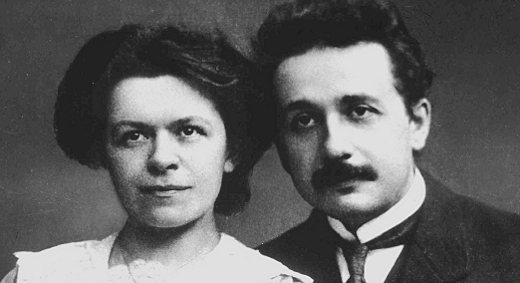
"Albert Ein­stein is the rare fig­ure who's uni­ver­sal­ly known, but almost entire­ly for his pro­fes­sion­al achieve­ments. Few of us who can explain the the­o­ry of rel­a­tiv­i­ty can also say much about the per­son­al life of the man who came up with it, though that does­n't owe to a lack of doc­u­men­ta­tion. Thanks to sci­ence YouTu­ber Toby Hendy, we have, for exam­ple, some of the love let­ters he wrote to the women who con­sti­tut­ed a ver­i­ta­ble parade through his life."
"Ein­stein mar­ried Mar­ić in Jan­u­ary 1903, says Hendy, "after they had been togeth­er for around five years. The rela­tion­ship was in its prime, and so was the aca­d­e­m­ic pro­duc­tiv­i­ty. It was in 1905 that Ein­stein would pub­lish his four major papers that would change the face of physics. By 1912, how­ev­er, Ein­stein had start­ed hav­ing an affair with his cousin," Elsa Lowen­thal."
"By 1914, Ein­stein wrote to Mar­ić a let­ter "detail­ing some con­di­tions of them con­tin­u­ing to live togeth­er," if not quite as man and wife. The con­di­tions read as fol­lows: CONDITIONS A. You will make sure: 1. that my clothes and laun­dry are kept in good order; 2. that I will receive my three meals reg­u­lar­ly in my room; 3. that my bed­room and study are kept neat, and espe­cial­ly that my desk is left for my use only."
Albert Einstein married Mileva Marić in January 1903 after roughly five years together. The marriage coincided with Einstein's peak academic productivity, including four major 1905 papers. By 1912 Einstein began an affair with his cousin Elsa Löwenthal. Einstein wrote letters during the process of divorcing his first wife, the Serbian physicist and mathematician Mileva Marić. By 1914 Einstein set out explicit conditions for continuing to live together without being man and wife, demanding arrangements for clothing and laundry, regular meals in his room, a neat bedroom and study, and exclusive use of his desk. The list also required renunciation of certain personal relations.
Read at Open Culture
Unable to calculate read time
Collection
[
|
...
]